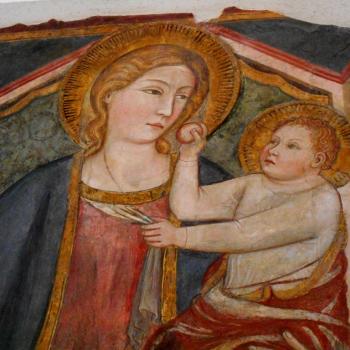This week we were stunned by the suicides of both Kate Spade and Anthony Bourdain. These successful lives cut short remind us that even in success and creative power, there can be crippling depression. On a much larger scale, we hear that our fellow Americans in Puerto Rico suffer from greatly elevated levels of mental illness in the wake of last season’s hurricanes. An NPR story describes efforts to stop the increases in depression, anxiety, PTSD, and suicide. The overall mood of the country has dimmed. We don’t invest in the mental health of our citizens. We are not living up to our greatest ideals. We see children killed in their classroom desks. We see desperate families at the border caged and separated. We see suicide reach epidemic levels. Depression is an illness that exists in any climate, but we have to ask ourselves, are we creating a culture in which the disease can grow? Are we doing all we can to help each other? Are we building an ethical and compassionate community?
When I was young, I fell in love with the “Boston Poets.” Peter Davison’s The Fading Smile (1996) was in the new books area of my local library and I carried it around with me for weeks. It made Boston seem like a city of poetry as it described the lives of Richard Wilbur, Stanley Kunitz, Maxine Kumin, Robert Lowell, L.E. Sissman, and others. The chapters on Sylvia Plath and Anne Sexton, however, had special weight. Both were monumental poets, feminist icons, and victims of depression and suicide. Sylvia Plath died at 30 in 1963. Anne Sexton at 45 in 1974. The summer after my freshman year of high school I read Plath’s letters home to her mother. Even though I knew where the trajectory of her life would lead her, I was so captivated by the exciting bursts of creativity and success in her life. A Smith alumna who then went on a Fulbright to England to write some of the most original poems of the postwar years seemed to me someone with a lot to be happy about. Yet, depression followed her her entire life with several suicide attempts before her death by suicide in 1963. A troubled marriage and the frustrations of an early career poet only added to her difficulties.
Since I have become a parent, her death hits with particular devastation. Who can imagine laying out bread and milk for one’s children before sealing up the kitchen and filling it with gas? To die while your children sleep in adjoining rooms? This is the disease of depression. Illogical, cruel, and persistent.
Plath has since become inextricably linked to her suicide and to depressive feelings more generally. Woody Allen, who fills his movies with women only to condescend to them, takes a swipe at Plath in Annie Hall. She has become a sort of reductive stereotype: the sad poet girl. This is absolutely unfair.
This is why instead of focusing on “Daddy” or “Lady Lazarus”—among her most famous poems dealing with depression and excellent—I turn most often to “The Moon in the Yew Tree” also from her posthumous collection Ariel. Some scholars argue this poem is the turning point from the earlier work of her career to the new, darker work that would come to define Ariel. If you have never read the poem, listen to Plath read it here. This is a great poem about alienation. She is by a churchyard and yet can feel no connection to those blue saints inside. Yet, she does not condescend to the faithful. “How I would like to believe in tenderness,” she writes. But she can’t. “I have fallen a long way,” she tells us:
Inside the church, the saints will be all blue,
Floating on their delicate feet over the cold pews,
Their hands and faces stiff with holiness.
The disconnect Plath feels is palpable. They are content inside, but stiff with a resolution she cannot feel. Instead, she receives direction from the moon:
The moon sees nothing of this. She is bald and wild.
And the message of the yew tree is blackness—blackness and silence.
It’s a joke among poets that writing about the moon is the most clichéd yet irresistible thing to do. Plath makes such new work of the moon. Bald and wild while the yew tree, nearer to our poet, is just black and silent underneath all that wildness. Outside all those rigid blue saints.
It can be hard to know what to do in times like these. Structural change needs to come, but in the meantime, try to connect. Let your holiness show with less stiffness and more gentle awareness. Reach out and in. Take care of yourself and make time to take care of others.












